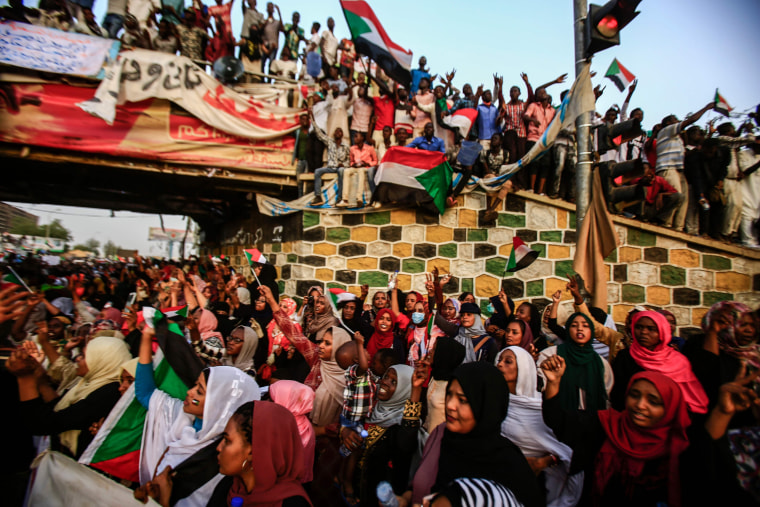KHARTOUM — The new head of Sudan's military council said on Saturday a civilian government would be formed after consultations with the opposition and the transition period would last for a maximum of two years, as protesters kept up pressure for rapid change.
In his first televised address, Lieutenant General Abdel Fattah al-Burhan Abdelrahman said he was also cancelling a night curfew ordered by his predecessor and ordered the release of all prisoners jailed under emergency laws ordered by ousted President Omar al-Bashir.
Bashir was overthrown on Thursday after weeks of mass protests brought on by rising food costs, high unemployment and increasing repression during his three decades in power.
Protest organisers had earlier on Saturday urged people to keep marching to demand a civilian government after the defense minister and the intelligence chief stepped down.
Defense Minister Awad Ibn Auf stepped down as head of the transitional military council late on Friday after only a day in the post.
Celebrations erupted on the streets of Khartoum overnight after Ibn Auf's resignation. Thousands of protesters waved flags and illuminated mobile phones in the darkness and drivers hooted car horns. People chanted: "The second has fallen!" a reference to Ibn Auf and Bashir, witnesses said.
"Islamists have now lost control and they are in shock. Their ability to project influence in an organized way inside the state appears weak," said Sudanese analyst Khalid al-Tijani.
"The reason for the changes in Sudan is the pressure from protesters and pressures within the army, and the fear among military commanders of a split in the armed forces."
The new head of the military council, Lieutenant General Abdel Fattah al-Burhan Abdelrahman, is a commander believed to be more ready to talk to demonstrators.
Burhan was the third most senior general in the Sudanese armed forces and is little known in public life. As head of Sudan’s ground forces he oversaw Sudanese troops fighting in the Saudi-led Yemen war and has close ties to senior Gulf military officials.
The military council said earlier it expected a pre-election transition to last two years at most or less if chaos could be avoided. The head of the military council's political committee, Omar Zain al-Abideen, said the council would hold a dialogue with political groups.
The announcement appeared aimed at reassuring demonstrators who had pressed for months for Bashir's departure and resumed protests against army rule after his ouster on Thursday, calling for quicker and more substantial change.
Bashir, 75, himself seized power in a 1989 military coup. He had faced 16 weeks of demonstrations sparked by rising food costs, high unemployment and increasing repression during his three decades of autocratic rule.
The protests escalated last Saturday when thousands of demonstrators, apparently bolstered by change in Algeria following similar protests, marched toward the Defence Ministry in central Khartoum to deliver a memorandum demanding the military side with them.
At least 16 people were killed and 20 injured by stray bullets at protests and sit-ins on Thursday and Friday, a police spokesman said. Government buildings and private property were also attacked, spokesman Hashem Ali added.
He asked citizens to help ensure safety and public order.
Protest organizers have vowed not to end their street action until a civilian transitional council is formed, saying rule by military commanders who for years were al-Bashir loyalists is just an extension of his regime.
Ibn Auf was Bashir's vice president and defense minister and is among a handful of Sudanese commanders whom Washington imposed sanctions on over their alleged role during atrocities committed in the Darfur conflict that began in 2003.
The council said on Friday it would not extradite Bashir, who has been indicted by the International Criminal Court in The Hague, over accusations of genocide in Darfur during the insurgency that led to the death of an estimated 300,000 people. He denies the allegations.
World powers, including the United States and Britain, said they supported a peaceful and democratic transition sooner than two years. China said it would continue to seek cooperation with Sudan regardless of the political situation.


